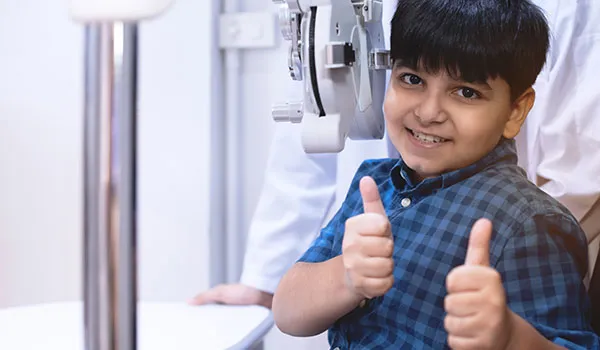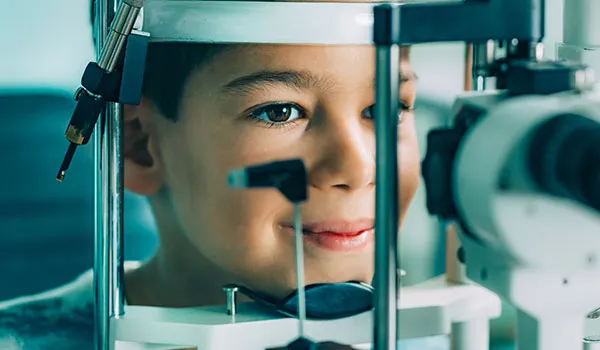
Ensure a Bright Future for Your
Child’s Eyesight
A child’s vision is crucial for their overall development and learning. Dr. Lav Kochgaway, a renowned pediatric ophthalmologist in Kolkata, is dedicated to providing comprehensive eye care for children of all ages. With a gentle and compassionate approach, Dr. Kochgaway ensures a comfortable and positive experience for young patients.

Why is Pediatric Eye Care Important?
Unlike adults, children cannot always express discomfort or vision problems clearly. Regular eye examinations are essential to detect and address any issues early on. Early intervention can prevent vision problems from affecting your child’s learning, development, and overall well-being.
Common
Childhood Eye Problems
- Refractive Errors: Nearsightedness, farsightedness, and astigmatism are common refractive errors that can affect a child’s vision. These conditions can often be corrected with glasses or contact lenses.
- Amblyopia (Lazy Eye): This occurs when one eye becomes weaker due to disuse. Early detection and treatment are crucial to prevent permanent vision loss.
- Strabismus (Squint): When the eyes don’t align properly, it’s called strabismus. Early intervention can often correct this condition.
- Color Blindness: This is a genetic condition affecting color perception. While it doesn’t usually impact vision, it can affect daily activities and certain professions.
- Congenital Cataracts: These are cataracts present at birth and require early surgical intervention.
- Blocked Tear Ducts: Common in infants, blocked tear ducts can cause excessive tearing.
- Eye Injuries: Accidents can cause eye injuries in children. Prompt medical attention is crucial.
- Eye Allergies: Allergies can cause discomfort and irritation in children’s eyes.
Our Pediatric Eye Doctor’s Approach to Eye Care
At Dr. Lav Kochgaway’s clinic, we understand the unique needs of children. Our team is dedicated to creating a welcoming and child-friendly environment. We use advanced diagnostic tools and treatment methods to provide the best possible care for your child’s eyes.
The Importance of Early Eye Exams
- A child’s vision is crucial for their overall development and learning. To ensure optimal eye health, it’s essential to schedule regular eye exams.
- The American Academy of Pediatrics recommends a comprehensive eye exam for children around the age of three. Early detection of vision problems like refractive errors, lazy eye, or other conditions allows for timely intervention, preventing potential long-term complications.
- Don’t wait for signs of trouble. Schedule a comprehensive eye exam for your child today. Early detection is key to a lifetime of clear vision.
Creating a Comfortable Experience
We understand that visiting the doctor can be stressful for children. Our clinic is designed to be child-friendly, with age-appropriate distractions and a gentle approach to examinations. Dr. Kochgaway’s expertise in communicating with children ensures a positive experience for both the child and parent.
FAQs
It’s recommended to have your child’s first eye exam around six months of age. However, earlier check-ups might be necessary for premature babies or those with family history of eye problems.
Signs include squinting, covering one eye, tilting the head to see, difficulty following objects, avoiding close work, or complaining of blurry vision.
Regular eye exams are crucial. The frequency depends on your child’s age and any underlying eye conditions. Your pediatrician or eye doctor can provide specific recommendations.
Yes, many young children are naturally farsighted. However, it’s essential to monitor their vision development through regular eye exams.
Amblyopia occurs when one eye becomes weaker due to disuse. Early detection and treatment are essential to prevent permanent vision loss.
Strabismus can be caused by muscle imbalance, neurological problems, or underlying eye conditions. Early diagnosis and treatment are important.
Color blindness is usually a genetic condition and cannot be cured. However, there are tools and strategies to help individuals with color blindness navigate daily life.
